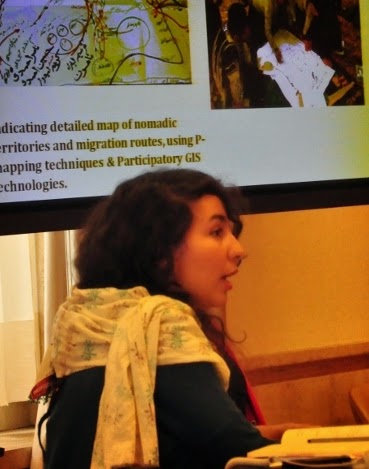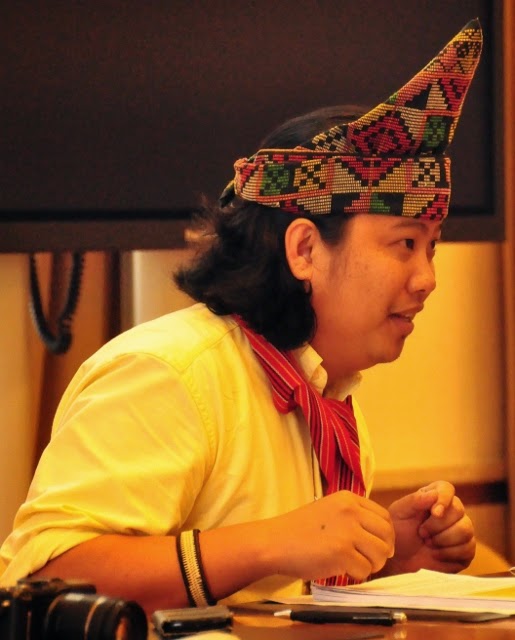On Monday 7 July, Natural Justice and the ICCA Consortium co-hosted a lunch-time event at the 7th Session of the Expert Mechanism on the Rights of Indigenous Peoples (EMRIP-7) on access to justice, the UN Declaration on the Rights of Indigenous Peoples, and Indigenous peoples’ and community conserved areas (ICCAs).
Holly Jonas (Natural Justice and ICCA Consortium International Policy Assistant) provided an introduction to ICCAs and access to justice. Emma Courtine (ICCA Consortium Programme Assistant) and Golshan Chahian (Cenesta, pictured at right) presented on a process for implementing rights-based approaches with the Indigenous nomadic tribes of Iran, which includes ICCA recognition, biodiversity conservation, sustainable livelihoods, and re-empowerment. On the latter in particular, Cenesta has a legal work group that aims to achieve nomad-friendly national laws and consists of four main bodies: tribal elders with knowledge of customary laws as legal advisors, lawyers, advocacy, and barefoot lawyers. Through this process, for the first time in national legislation history, Indigenous peoples and local communities in Iran provided suggestions for review and revisions of key national laws, which led to the inclusion of a new chapter on peoples’ participation and rights of Indigenous peoples and local communities.
Andrew ‘Atama’ Kitama (PACOS Trust) showed a short film and spoke about Native Customary Rights in Sabah, Malaysia, and efforts to engage in international processes such as the Universal Periodic Review. He outlined the intensive pressures Indigenous peoples face from mainstream ‘development’ programmes that aim to elevate Malaysia’s status to a developed country by 2020 but are in actuality creating larger gaps and further marginalisation. Subsistence farming is still seen as unsustainable and incompatible with the broader development agenda and the once-lauded Communal Title provision in the Land Ordinance has been distorted into a fast-tracked approval process that in effect forces communities into joint ventures, usually with oil palm companies. He lamented the lack of mechanisms for Indigenous peoples to be genuinely involved in decision-making and upholding political accountability and underscored the importance of communities’ ownership over their futures, rather than simply being ‘beneficiaries’ in misguided poverty eradication programmes.
Joseph Itongwa (Programme d’Intégration et de Développement du Peuple Pygmée au Kivu) and Christian Chatelain (ICCA Consortium Regional Co-coordinator for Central and West Africa) presented a short film on traditional knowledge schools among the Indigenous peoples in the Bambuti Forests in the Democratic Republic of Congo. They also spoke of the recognition of ICCAs as a matter of justice and respect and the importance of supporting conservation practices emerging from traditional rites of passage.
The presentations were followed by an active discussion with those in attendance, which included the following issues, among others:
- The critical importance of appropriate recognition of customary lands and traditional institutions and the bottom-up development of legal options and laws and policies that reflect and are adapted to local realities;
- The need to build the capacity of judges and lawyers on related international law and jurisprudence, and to build pressure for implementation of landmark judgments such as Endorois through lobbying at different levels;
- Concerns with militarisation of protected areas (for example, due to poaching) and the dispossession of people from their territories through conservation initiatives;
- The need for barefoot lawyers and community-accessible information (legal and non-legal) to demystify the law;
- The role of Article 26 of UNDRIP as key for implementation and recognition of Indigenous peoples’ lands and territories;
- The status and situation of the Indigenous Tatars of Crimea (given the current conflict with Russia) and the erosion of their collective rights and identity; and
- The deep-seated roots of ICCAs and their role in reclaiming identities, histories and cultures, and that peoples and communities themselves, not governments or NGOs, need to identify and uphold good practices for ICCAs.











